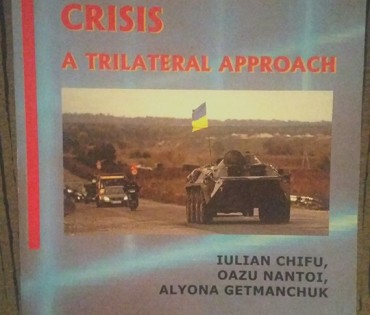Iulian Chifu, Oazu Nantoi, Alyona GetmanchukTo download the publication in pdf
The study is done based on an original methodology of the Conflict Prevention and Early Warning Center that has been improved and refined. It is a result of a common effort of three teams coming from three countries: Romania, Republic of Moldova and Ukraine.
Our main objective was to offer the responsible institutions and decision makers with a full map of possible scenarios, in order for them to prepare and address each possibility and to avoid strategic surprise if an uncharted event will occur.
All in all, we have the following final partition of the scenarios:
– Short term: 22 strong signal scenarios, 10 weak signal scenarios and 3 black swan scenarios;
– Medium term: 21 strong signal scenarios, 6 weak signal scenarios, 4 Black swan scenarios;
– And 14 strong signal scenarios, 4 weak signal scenarios, black swan scenarios covering the long term.
The most important conclusions of these scenarios are:
1. Arming Ukraine means stabilising Ukraine, at least for the medium and long term evolution of the country. It is true that in the short term this step is debatable as long as the security sector reform according to NATO standards is not fully accomplish and as the troops that are going to defend the internal de facto border between East and West inside Ukraine are not trained to use these modern weapons and complementary techniques.
2. Ukraine should make real and sustainable economic reforms in order to enforce the Ukrainian state and builds up strong institutions that would allow a better outcome in any case of a bad scenario evolution.
3. The Western countries should not support without a full critical approach any type of federalisation or the enforcement of solutions detrimental to the stability, sustainability and even survival of the Ukrainian state.
4. The cohesion of the pro-reform coalition in the Parliament is of first importance, as that of the pro-European and pro-Western government and the cohesion between state and society. This grants a high level of resilience for the Ukrainian when state facing any type of pressure in the harder times to come.
5. Pushing for democratic and economic reforms in Russia, in the medium and long term, is another way to stabilise the Eastern Ukraine region, to reject revisionism, revanchist attitudes and the neo-imperial approach in Europe as well as to diminish the instruments used to move artificially the borders within Europe and the resources available for aggressive political projects, including those which are threatening world peace and regional stability.
These are the teams involved in the book:
Ukraine: Alyona Getmanchuk, Institute of World Policy; Anton Antonenko, DiXi Group; Leonid Litra, Institute of World Policy; Olekisy Melnyk, Razumkov Centre; Sergiy Gerasymchuk, Strategic and Security Studies Group; Sergiy Solodkyy, Institute of World Policy
Republic of Moldova: Oazu Nantoi, Stella Uþicã, Iurie Pintea, Viorel Cibotaru, Arcadie Barbaroie
Romania: Iulian Chifu, Narciz Balasoiu, Adriana Sauliuc, Radu Arghir, Diana Bãrbuceanu, Alexandru Voicu, Carola Frey, Adina Cincu, Adrian Barbu, Eveline Marasoiu.
The study is supported by the Black Sea Trust of the German Marshall Found.




Comments theme
Comments themeComments themeComments themeComments themeComments themeComments themeComments themeComments themeComments themeComments themeComments themeComments themeComments themeComments themeComments themeComments themeComments themeComments themeComments themeComments.